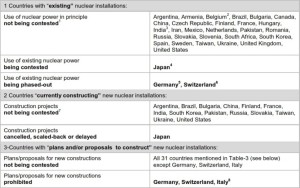The report, ‘World Energy Perspective: Nuclear Energy One Year After Fukushima’, finds that:
-
Little has changed, especially in non-OECD countries, with regard to the role of nuclear in the energy mix.
-
Global governance of the nuclear sector needs to be improved.
-
There is critical need to inform the public about issues relating to nuclear generation technologies, safety, costs, benefits, and risks.
The report says that currently, around 50 countries are operating, building, or considering nuclear power as part of their energy mix. More than 60 nuclear power plants are under construction worldwide, with China, Russia, and India accounting for 66% of the addition in new nuclear capacity.
The growth in the utilisation of nuclear power has been mainly driven by non-OECD countries, where demand for energy is rising sharply. These countries account for 39 out of the 63 nuclear power plants currently being built worldwide (including 26 in China, 10 in Russia, 7 in India).
The report was compiled by energy experts, practitioners, and regulators from 13 countries, including feedback from WEC’s network in over 90 countries.
For more information, contact Philip Thomas (thomas@www.worldenergy.org) who coordinated the work.






_-80_result_688_387_s_c1_c_c.jpg)


